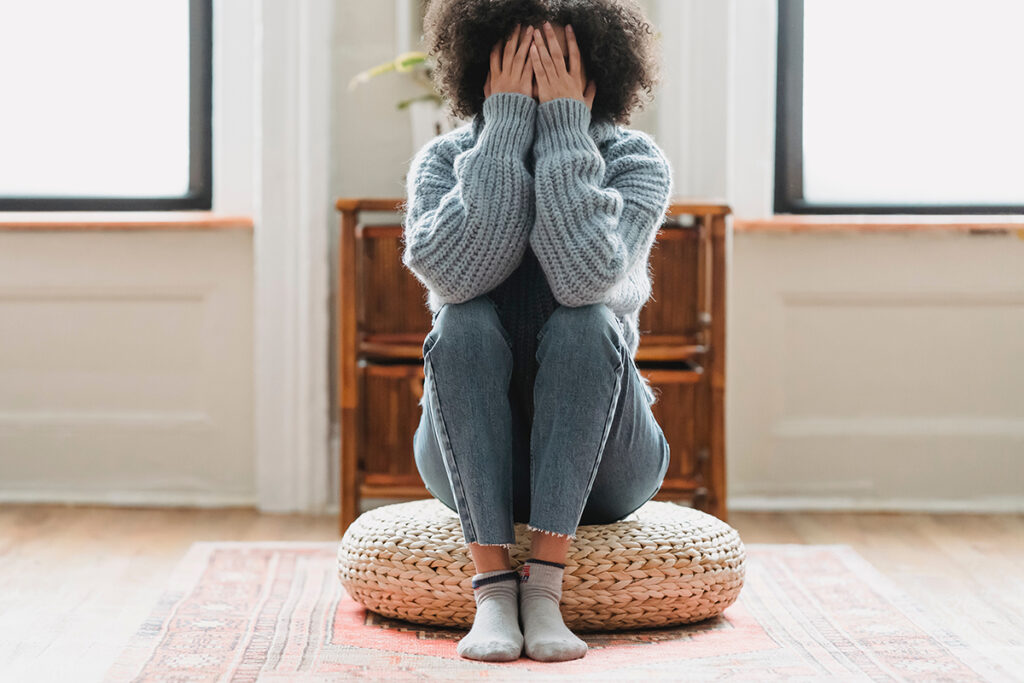I’m Fine, It’s Fine, Everything is Fine…
by Cyndi Williams, MSW, LCSW

Sound familiar? I’ve had clients I’d been working with in therapy for quite some time who eventually asked, “I’m fine, things are getting better, so why am I still so sad/numb/angry?”
Most of my clients aren’t widows, but they are working through various life transitions, losses, and relationships of their own. I continue to remind them, and want to remind you too, that we are living in a time of unprecedented global sadness, grief, and division. Assuming you aren’t living under a rock, you’ve heard or engaged in arguments about COVID-19, vaccines, masks, or politics which have resulted in hateful comments, a lack of ability to empathize, disrespect, or, at their worst, broken relationships or violence.
After my husband died, I found the 24-hour news cycle unbearable. I had zero energy to spare when a coworker complained about being a “hunting season widow” or how angry she was that her husband left a sink full of dishes. I had little compassion to spare for friends who stressed over their children’s ACT scores while my children were navigating emotional devastation unfair for their young age.
I am normally a very compassionate person who is drawn to human connection, but I felt the desire to retreat into my home with my arms around my grieving children. I felt like I couldn’t even remember being concerned about the things everyone else seemed to be so occupied with. It made me feel more invisible and isolated than ever before in my life. I wondered if I would ever again care about anything besides my and my children’s overwhelming pain.
Being in a care-giving profession, I was able to recognize that what I was feeling was a form of compassion fatigue. Compassion fatigue is a term that those working in healthcare often hear, but I believe we are now living in a time of global compassion fatigue. The term describes the difficulty, or total inability, of experiencing empathy or concern for others’ pain as a result of being exposed to a high level of pain and suffering for a prolonged period of time.
Since the beginning of the COVID-19 pandemic, we’ve all felt sadness as we learn of those we love becoming ill or dying, watch the global death count grow, and experience a higher-than-normal level of anxiety and isolation with no end in sight as the pandemic seems to drag on. The political climate in the United States has become so divisive and polarized that it is tearing apart families and communities. For widows, this is even more difficult as we also try to navigate our own grief and the secondary losses we’ve experienced in social, spiritual, financial, and other areas of our lives.
If this all seems relatable, you are already in the right place to find compassion in others and if needed, begin learning again how to feel compassion for others. Modern Widows Club has created a global community of those who have experienced a similar loss, and wisters everywhere are reaching out to find a local or virtual group to align with as we continue to walk this road together. We all share the same desire: to Hope, Heal, and Grow.
When MWC Founder Carolyn Moor visited the St. Louis, Missouri Community on her Moor Luv Tour in August 2021, she talked with a small group of wisters about the political realities we are all living in. She shared that she had recently been asked where she stands on the issues, and her response was “I support the politicians and policies that make widow’s lives better now and in the future because that’s what matters most to me.” I couldn’t put it more simply or powerfully.
I can’t fix all of the things that are wrong in our world, but I can help and influence those in my circle. Personally, I’ve chosen a life of media abstinence to help maintain my well-being. When I need to be informed about a topic, I seek out the information from multiple trusted sources from various perspectives to try to make the best informed decisions for myself.
I don’t engage in arguments with those who feel differently, or try to convert others to my way of thinking, except in the areas of widow advocacy and mental health. Even then, I choose to champion those issues with patience, kindness, and grace whenever possible.
If you are feeling like your compassion bank is close to bankrupt, I encourage you to take some time to reflect. What is your true passion? How much energy can you spare? Where can your limited resources have the greatest impact? Then, based on your unique situation, set boundaries and filter the amount of information and trauma you’re exposing yourself to. Choose to engage in the activities and relationships with the greatest mutual benefit until your reserves are greater and you can expand your efforts and impact.
Eventually you will get to the Lead stage of your widow journey, but along the way protect yourself from compassion fatigue so you can continue to move forward in your own time, and in the healthiest way for you.
Cyndi Williams is a mental health advisor and contributor for Modern Widows Club, currently working as a mental health therapist at Sandhill Counseling and Consultation in St. Louis, Missouri.

